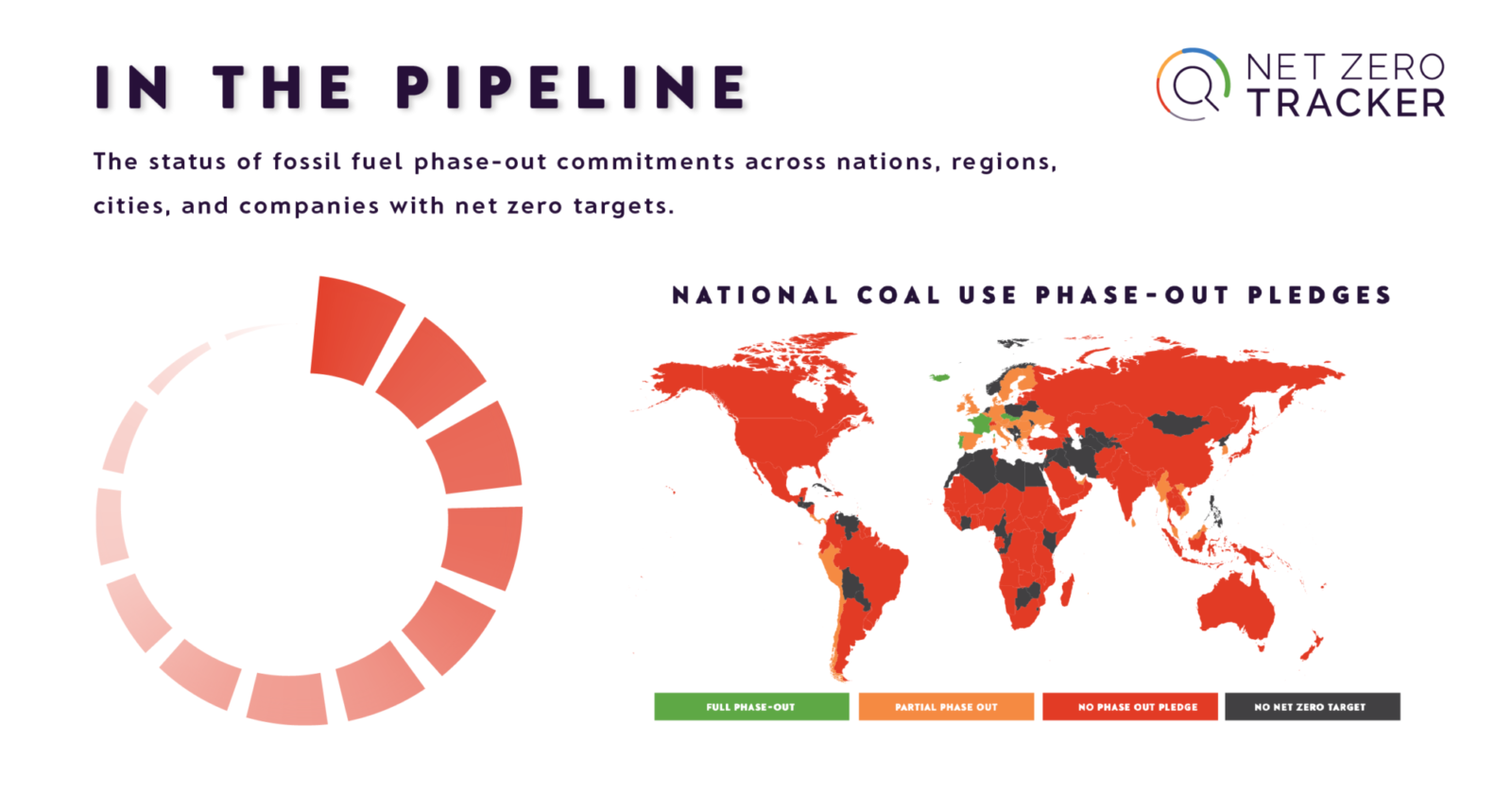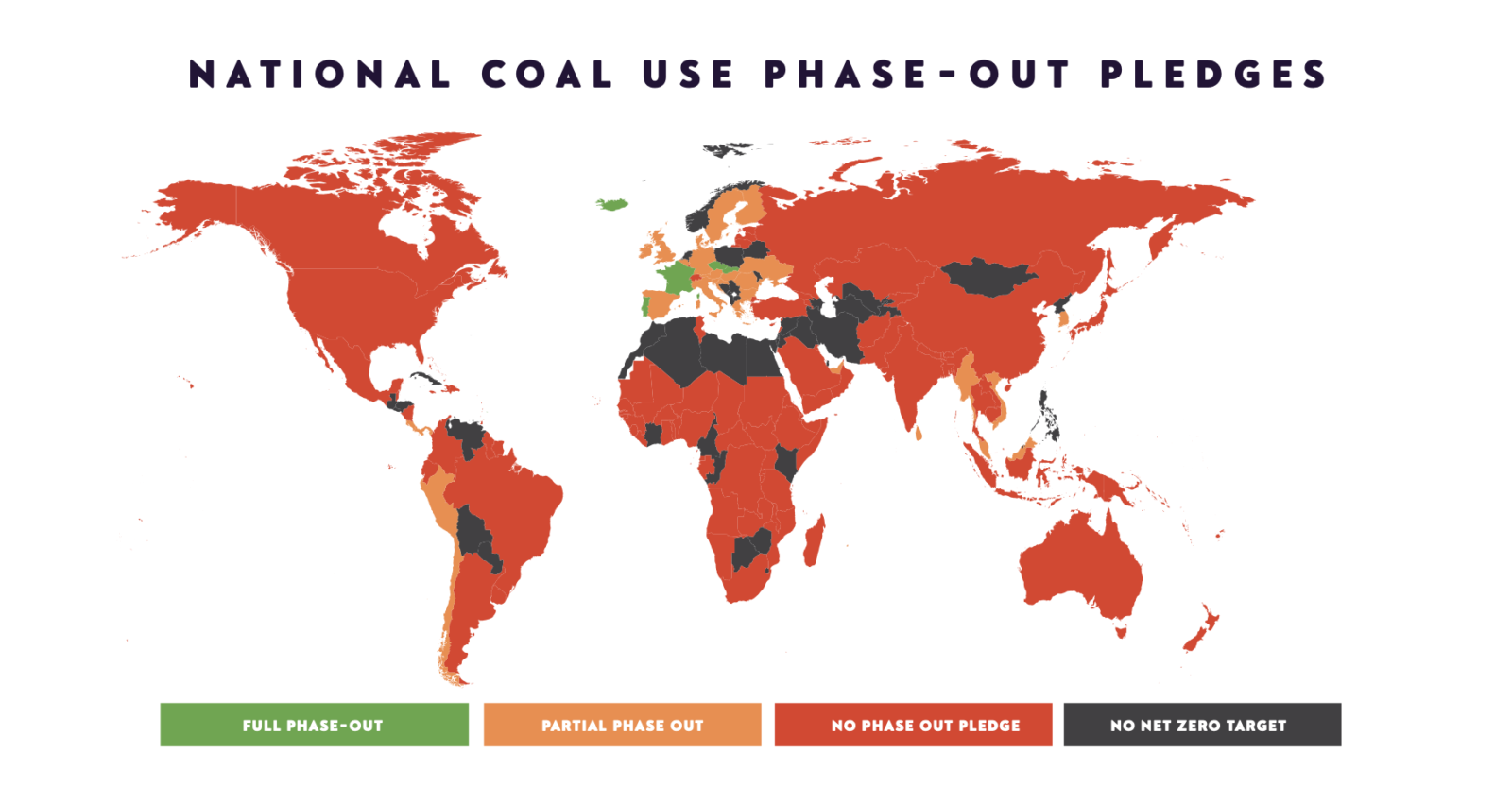In the pipeline: The status of fossil fuel phase-out commitments
The status of fossil fuel phase-out commitments across nations, regions, cities, and companies with net zero targets.
4 DEC 2023

Despite rapid and wide uptake of net zero targets, the majority of countries, states and regions, cities and companies have not yet committed to end fossil fuel exploration, production, and use on a timescale consistent with the Paris Agreement’s temperature goals.
Watch a replay of the Net Zero Tracker press conference launching the report at the COP28 UN climate summit here.

The main driver of climate change is emissions of carbon dioxide (CO₂), and the main source of CO₂ emissions is the use of fossil fuels. Fifteen nations including Ethiopia, France and Spain recently recognised this fact, calling for a global agreement to phase out fossil-fuel production because ‘fossil fuels are at the root of this [climate] crisis’ (High Ambition Coalition, 2023).
Calls for removing fossil fuels from the world’s energy system are growing louder because now there are viable alternatives:
- At COP28, nations, including China and the US, are preparing to agree to a new global plan to triple renewable energy capacity by 2030 (COP28 Presidency, 2023).
- A new record of adding more than 500 gigawatts (GW) of renewable generation capacity is likely to be set this year (International Energy Agency, 2023).
- Solar PV and onshore wind are now more competitive than fossil fuels — and in China alone, projected additions of solar PV and offshore wind by 2030 are now three times higher than in 2021 (International Energy Agency, 2023; IRENA, 2023).
- Sales of electric vehicles could surpass those of fossil fuel-burning cars within the next six years. In 2020, one in 25 cars sold was electric; just three years later, it is one in five (Boehm et al., 2023).
Unlike with the wider uptake and investment in clean energy, there is scant data on national, subnational and private sector entities’ ambition and timeframes for phasing out fossil fuels. This analysis is our contribution to closing the data gap on the most important part of the climate problem.
Summary of the report
Despite rapid and wide uptake of net zero targets, the majority of countries, states and regions, cities and companies have not yet committed to end fossil fuel exploration, production, and use on a timescale consistent with the Paris Agreement’s temperature goals.
On coal, 3% of coal-producing countries with net zero targets (2/63) have committed to fully phase out exploration. More have committed to phase out production: 13% (6/45) of coal-producing nations have committed to full coal production phase outs, which represents 5% of global coal production (of countries with a net zero target).
3% of oil-producing countries with net zero targets (3/91) have committed to fully phase-out oil exploration, with a similar number (3%) of gas-producing countries with net zero targets committing to fully phase out gas exploration. 3% (5) of oil-producing countries with net zero targets have committed to fully phase-out oil production, which represents 0.8% of global oil production (of countries with a net zero target). 3% (2) of gas-producing countries with net zero targets have committed to fully phase-out gas production, which represents 0.8% of global gas production (of countries with a net zero target).
National net zero targets cover 88% of global GHG emissions, but only 7% of those emissions are covered by at least one full or partial phase-out commitment relating to exploration, production or use (fossil fuel activities) of coal, oil or gas (fossil fuel types), while just 18% of the combined revenue of our sample of publicly-listed companies is covered by at least one phase-out commitment across all fossil fuel activities and types.
Corporate coal phase-outs show signs of progress: 56% (145 of 259) of publicly-listed companies that engage in (or facilitate) coal production have made a full or partial phase-out pledge for coal. Much less advanced are phase-outs of either oil or gas. Only 3% of companies actively involved in oil or gas production have a full oil production phase-out pledge, with the same percentage pledging to phase-out gas production.
Regionally, Africa has the highest percentage of company fossil fuel phase-out targets (50%, or 5 of 10 companies), with a strong showing from Europe (27%, or 88 of 328). North America lags significantly behind with only 9% (31 of 327) of companies in the sample having any kind of phase-out commitment.
To move forward, countries, states and regions, cities and companies can look to examples of good practice. For example:
Spain has embedded national phase-out targets into legislation.
Stockholm has extended the remit of its phase-out to industry-related fossil fuel use.
Ørsted has successfully diversified its business model away from fossil fuel dependence.
An urgent short-term priority for all entities, particularly countries and their governments, should be committing to urgently phase out exploration for any new reservoirs or deposits of all fossil fuel types.
